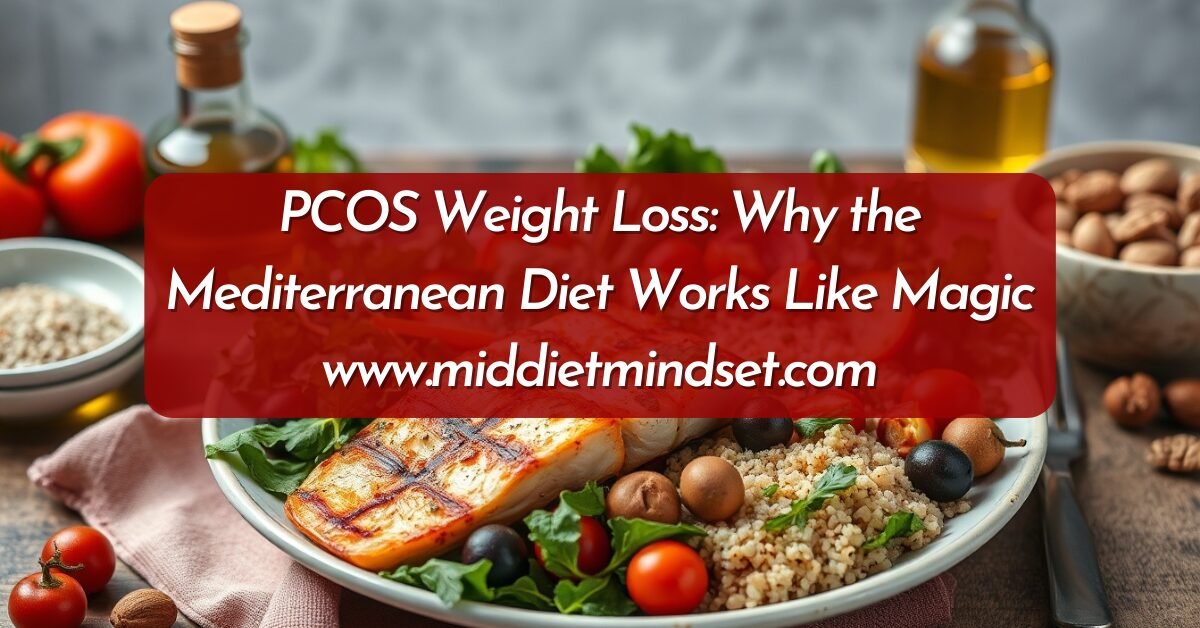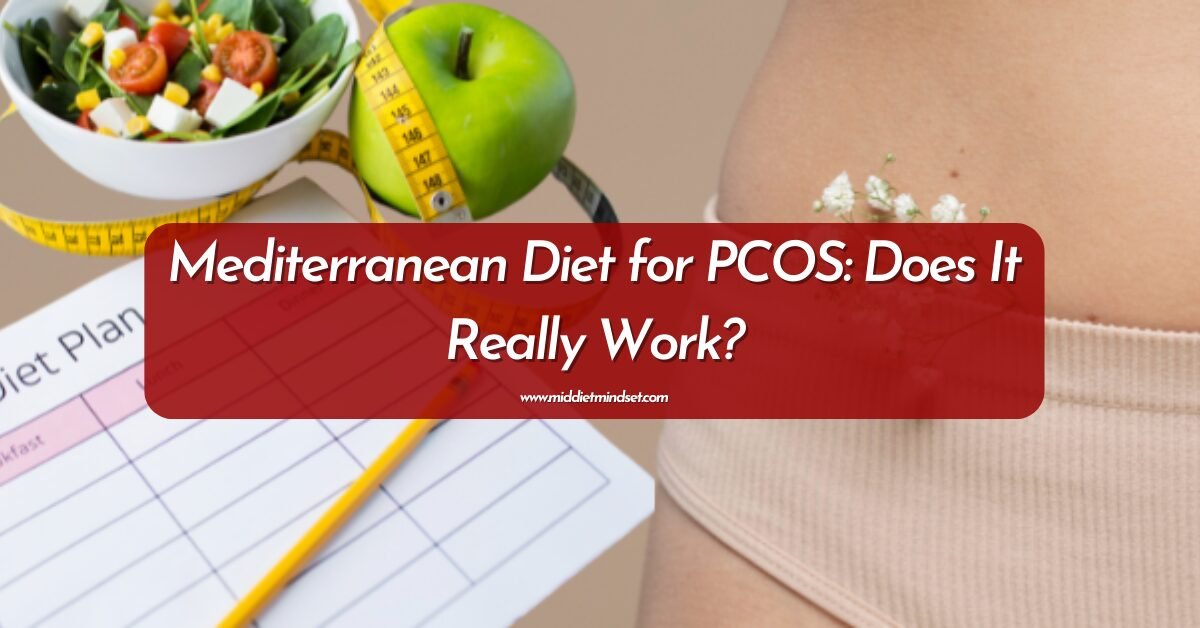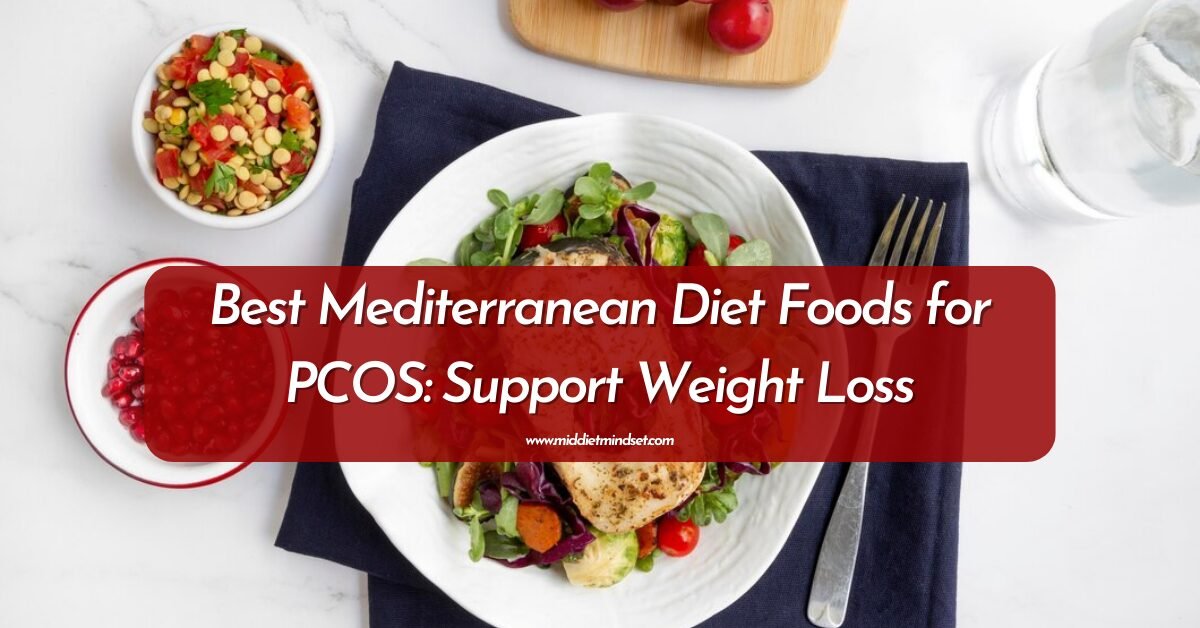Table of Contents
ToggleIf you’ve been struggling to lose weight with PCOS (Polycystic Ovary Syndrome), you’re not alone. Many women with PCOS face challenges like stubborn weight, frustrating plateaus, and feeling like no matter what they do, nothing works. It’s true—PCOS makes weight loss harder. However, there’s a solution that’s not only effective but also sustainable: the Mediterranean diet for PCOS weight loss.
As an experienced dietitian specializing in weight loss for PCOS, I’ve seen the transformative power of this eating style. It’s not a quick-fix fad but a science-backed, balanced approach that aligns perfectly with the specific needs of women with PCOS. In this article, I’ll explain why the Mediterranean diet works like magic—and how it can work for you, too.
Why PCOS Makes Weight Loss So Difficult
Hormonal Chaos and Weight Gain
PCOS is closely tied to hormonal imbalances—especially an overproduction of androgens (male hormones like testosterone) and irregular estrogen levels. This hormonal chaos can cause weight gain, particularly around the belly, and make it nearly impossible to lose weight through traditional diet and exercise.
Insulin Resistance: The Root of the Problem
Most women with PCOS also deal with insulin resistance, where your body’s cells stop responding well to insulin. This causes your blood sugar to spike and crash, leading to intense cravings and increased fat storage. It’s a vicious cycle: more insulin in your bloodstream means more fat storage, especially around the abdomen.
Personally, I’ve seen clients who feel like they’re doing everything right—exercising regularly and eating healthy—but still not losing weight. Nine times out of ten, it’s because insulin resistance isn’t being addressed properly.
Chronic Inflammation and Fat Retention
PCOS also leads to higher levels of inflammation throughout the body, which further complicates weight loss. Chronic inflammation doesn’t just make you feel sluggish; it’s also linked to increased fat retention and difficulty shedding pounds.
With all this stacked against you, it’s no wonder losing weight with PCOS feels impossible. But that’s where the Mediterranean diet for PCOS weight loss comes in, offering a natural, long-term solution.

The Mediterranean Diet: A Perfect Fit for PCOS Weight Loss
A Nutrient-Dense, Balanced Approach
Unlike restrictive diets that eliminate entire food groups, the Mediterranean diet for PCOS weight loss focuses on nutrient-dense, whole foods. Think of it as an eating style that prioritizes balance: lots of vegetables, lean proteins, whole grains, and healthy fats like olive oil and nuts. This diet is rich in fiber, antioxidants, and omega-3 fatty acids—all nutrients that work wonders for PCOS.
One of my clients was frustrated after years of trying low-carb and keto diets, which left her feeling deprived and fatigued. Once she transitioned to the Mediterranean diet for PCOS weight loss, she not only started losing weight but also felt more energized and satisfied after meals. She wasn’t starving herself or fighting constant cravings anymore, and it made all the difference.
Anti-Inflammatory Powerhouse
PCOS and inflammation go hand-in-hand, but the Mediterranean diet for PCOS weight loss is known for its anti-inflammatory properties. Foods like olive oil, fatty fish (like salmon), and plenty of leafy greens can help reduce inflammation in the body. Less inflammation means less weight retention and more energy for physical activity.
Blood Sugar Control and Improved Insulin Sensitivity
Perhaps the biggest benefit of the Mediterranean diet for PCOS weight loss is how it helps stabilize blood sugar levels and improve insulin sensitivity. Since it’s rich in fiber (from vegetables, legumes, and whole grains), it slows the absorption of sugars into your bloodstream, preventing the spikes and crashes that lead to cravings and overeating.
After just a few weeks on this diet, many of my clients notice fewer sugar cravings and more consistent energy throughout the day. This is crucial for anyone with PCOS since managing blood sugar is key to managing weight.

Breaking Down the Magic: How It All Works Together
Increased Insulin Sensitivity
When you improve insulin sensitivity, your body can process carbohydrates more efficiently, meaning less sugar gets stored as fat. The Mediterranean diet for PCOS weight loss’s focus on whole grains, legumes, and lean proteins helps keep insulin levels steady, which can lead to steady, sustainable weight loss.
Reducing Belly Fat
Fat around the abdomen, often referred to as visceral fat, is a common struggle for women with PCOS. The Mediterranean diet for PCOS weight loss’s emphasis on healthy fats—like those found in olive oil, nuts, and avocados—has been shown to reduce visceral fat. While it might seem counterintuitive to eat fat to lose fat, the types of fat in this diet actually encourage your body to burn fat more efficiently.
Appetite Control and Satiety
Because the Mediterranean diet for PCOS weight loss is high in fiber and healthy fats, it keeps you fuller for longer. This makes it easier to control your appetite without feeling deprived. You won’t be battling hunger pangs two hours after a meal because you’ll be nourished and satisfied.
Boosting Energy
A common complaint among my clients with PCOS is fatigue. The nutrient-rich foods in the Mediterranean diet for PCOS weight loss—such as lean proteins, whole grains, and fresh produce—provide steady, sustained energy. When you’re not bogged down by sugar crashes or processed foods, you’ll find it easier to stay active, which is key to weight loss.

Building Habits for Long-Term Success
Mindful Eating
One of the reasons the Mediterranean diet for PCOS weight loss works so well for PCOS is that it encourages mindful eating. This means paying attention to your hunger and fullness cues and savoring your meals. Slowing down while you eat can help prevent overeating, which is especially important if you struggle with emotional or binge eating due to PCOS.
Meal Prep and Planning
Succeeding with the Mediterranean diet for PCOS weight loss doesn’t require fancy recipes or elaborate meal plans. In fact, simple is better. I always recommend that my clients prepare basic meals that they can customize throughout the week. For example, cook a batch of whole grains, roast some veggies, and have lean proteins on hand. From there, you can mix and match to create easy, balanced meals.
Consistency Over Perfection
One thing I stress to my clients is that consistency is more important than perfection when following the Mediterranean diet for PCOS weight loss. Life happens—you’re going to eat out, have a piece of cake, or miss a workout. That’s okay! What matters is that you stick to the core principles of the Mediterranean diet most of the time. Over time, those small, consistent choices lead to lasting results.
Adding Exercise for Synergy
Exercise, especially resistance training, pairs beautifully with the Mediterranean diet for PCOS weight loss. Strength training helps improve insulin sensitivity, which means your body will respond even better to the foods you’re eating. Plus, exercise is a great way to combat fatigue and boost your mood.

Scientific Evidence for the Mediterranean Diet for PCOS Weight Loss
I’ve seen firsthand how transformative the Mediterranean diet for PCOS weight loss can be for women with PCOS. One of my clients, a 35-year-old woman who had been struggling to lose weight for years, lost 25 pounds over six months by adopting this eating style and sticking to a regular exercise routine. Her energy levels soared, her menstrual cycles became more regular, and she finally felt in control of her health again.
And the science backs this up. Numerous studies have shown that the Mediterranean diet for PCOS weight loss not only aids in weight loss but also improves insulin sensitivity and reduces inflammation—two key factors in managing PCOS1. It’s a proven, effective approach that addresses the root causes of weight gain in PCOS, rather than just treating the symptoms.
Take Action: How to Get Started
Ready to give the Mediterranean diet for PCOS weight loss a try? Here’s how:
- Start with Small Changes
You don’t need to overhaul your entire diet overnight. Begin by adding more fruits, vegetables, and healthy fats to your meals. - Focus on Whole Foods
Cut back on processed foods and sugars. Opt for whole grains, lean proteins, and healthy fats like olive oil and nuts. - Incorporate Meal Planning
Planning your meals ahead of time will help you stay on track and avoid unhealthy choices when you’re hungry. - Work with a Professional
For a more personalized approach, consider working with a registered dietitian who can tailor the Mediterranean diet for PCOS weight loss to your specific needs and PCOS symptoms.

Conclusion: Why the Mediterranean Diet for PCOS Weight Loss is the Best Choice for Sustainable Weight Loss
The Mediterranean diet for PCOS weight loss is more than just a diet—it’s a lifestyle that supports sustainable weight loss, hormonal balance, and overall health. By focusing on nutrient-dense, whole foods that reduce inflammation and stabilize blood sugar, it directly addresses the core challenges of PCOS. And the best part? It’s not about restriction or deprivation—it’s about nourishing your body in a way that feels good and works long-term.
If you’re ready to take control of your PCOS and finally see results, the Mediterranean diet for PCOS weight loss could be the magic you’ve been waiting for.
F.A.Q.
PCOS is closely tied to hormonal imbalances—especially an overproduction of androgens (male hormones like testosterone) and irregular estrogen levels. This hormonal chaos can cause weight gain, particularly around the belly, and make it nearly impossible to lose weight through traditional diet and exercise.
The Mediterranean diet for PCOS weight loss’s focus on whole grains, legumes, and lean proteins helps keep insulin levels steady, which can lead to steady, sustainable weight loss.
Start with Small Changes: You don’t need to overhaul your entire diet overnight. Begin by adding more fruits, vegetables, and healthy fats to your meals.

Nour is a registered dietitian, nutrition researcher, and founder of MedDietMindset. With a passion for evidence-based nutrition, she specializes in Mediterranean diet strategies, PCOS management, and sustainable weight loss. Nour is dedicated to transforming complex scientific research into clear, actionable guidance to support healthier, long-lasting lifestyle changes. Through her blog, she empowers readers to build habits that prioritize well-being, balance, and vitality.


